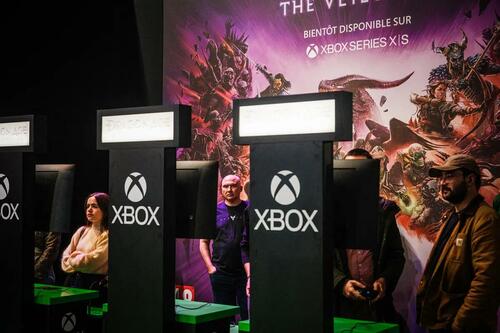
Authored by Stacy Robinson via The Epoch Times (emphasis ours),
BioWare, developer of the wildly popular Mass Effect and Dragon Age video game series, is at the center of a new battle.
Following the failed launch of two costly triple-A titles, the studio was banking on a win. Its latest offering is the fourth title in the Dragon Age series; the last was released 10 years ago.

Initial reactions to trailers for Dragon Age: The Veilguard were decidedly negative. Longtime fans of the series criticized the softer, stylized art of the new game, comparing it to a Disney-Pixar movie.
But after BioWare invited a group of streamers and critics to a private, hands-on demo of the game, hope was rekindled. Those who had experienced Veilguard firsthand were generally positive, and encouraged fans of the series to wait for the full release.
Days before its release, clips of Veilguard were leaked, revealing that the game was rife with transgender ideology and messaging based on diversity, equity, and inclusion (DEI).
One scene showed a character doing pushups as penance for forgetting to use “they/them” pronouns, and then lecturing about how a simple apology was not enough for the crime of “misgendering.”
Another scene, in a high fantasy setting with dragons and elves, showed a character revealing to her parents that she identified as nonbinary.
The game’s character customization system does not allow for the creation of curvy female characters but it does allow players to add mastectomy scars.
Laura Kate Dale, “queer representation critic and consultant” and author of “Gender Euphoria,” posted on social media platform X about having worked on the project.
Corinne Busche, Veilguard’s game director, is also transgender. Busche told co-workers that the goal for the Dragon Age team at BioWare is to use games to create a safe space for the LGBT community.
“It’s such a rare thing for marginalized communities to have representation where we feel proud and powerful in how we are depicted. It’s so deeply meaningful for so many,” Busche said in a developer interview on BioWare’s website.
While it is true that previous Dragon Age titles featured LGBT characters—and allowed players to romance same sex characters in-game—Veilguard’s approach seems to have struck a different chord this time.

Critics’ Reviews
While some fans were still scratching their heads at the leaked clips, early critic reviews for Veilguard were mostly positive.
The game received the thumbs-up from Eurogamer, Game Rant, and GamingBible—all of whom awarded it a perfect 100 out of 100. Even Finger Guns, which gave it a lower-end score of 60, called it “a solid, albeit, unspectacular RPG experience.”
IGN—notorious for giving scores of seven—gave Veilguard a nine out of 10. [ZH: lol]
That review was received differently when it was revealed the critic identifies as transgender; IGN released an alternate, less positive review shortly thereafter.
Some critics were more tepid in their response.
Games journalist Skillup gave the game a “cannot recommend” evaluation. He didn’t mention the progressive content and instead referred to the game’s “silly and childish” tone, and lack of narrative subtlety.
“This game cannot surface any ideas without just saying them aloud,” he said.
“Every interaction sounds like HR is in the room.”
He—and others—also criticized the “hollow and repetitive” gameplay loop. “Zero variety in mission design,” he noted. He said he eventually lowered the game’s difficulty settings, just so he could rush through it more quickly.
The disparity between professional critic reviews and those by consumers is stark: Metacritic shows the game’s audience score is 3.8 out of 10 for Playstation users; the score for PC users is 2.5.

Costly Business
Triple-A game development is a risky, expensive business. Games can cost hundreds of millions and take years to develop; one failure may drive a studio out of business.
Official sales numbers for Veilguard have not been released—a common practice unless a game does very well—but speculation abounds. It is unlikely the real numbers will be known before EA’s earnings call in February
One way of gauging sales is to look at the number of concurrent players on STEAM, the world’s largest digital PC video game marketplace. Veilguard reached a maximum of just over 89,000 players on Nov. 3.
By comparison, Farming Simulator 25 peaked at more than 135,000 concurrent players.
Veilguard is reported to have sold more than a million copies—not a great result for a triple-A title that may have cost between $80 million and $200 million to develop.
By contrast, Game Science’s recent release Black Myth: Wukong sold 18 million copies within its first two weeks.
And while Veilguard was given positive reviews by gaming media, Wukong’s development team was accused of sexism, fat-shaming, and homophobia just ahead of the release.
Read the rest here...
Authored by Stacy Robinson via The Epoch Times (emphasis ours),
BioWare, developer of the wildly popular Mass Effect and Dragon Age video game series, is at the center of a new battle.
Following the failed launch of two costly triple-A titles, the studio was banking on a win. Its latest offering is the fourth title in the Dragon Age series; the last was released 10 years ago.

Initial reactions to trailers for Dragon Age: The Veilguard were decidedly negative. Longtime fans of the series criticized the softer, stylized art of the new game, comparing it to a Disney-Pixar movie.
But after BioWare invited a group of streamers and critics to a private, hands-on demo of the game, hope was rekindled. Those who had experienced Veilguard firsthand were generally positive, and encouraged fans of the series to wait for the full release.
Days before its release, clips of Veilguard were leaked, revealing that the game was rife with transgender ideology and messaging based on diversity, equity, and inclusion (DEI).
One scene showed a character doing pushups as penance for forgetting to use “they/them” pronouns, and then lecturing about how a simple apology was not enough for the crime of “misgendering.”
Another scene, in a high fantasy setting with dragons and elves, showed a character revealing to her parents that she identified as nonbinary.
The game’s character customization system does not allow for the creation of curvy female characters but it does allow players to add mastectomy scars.
Laura Kate Dale, “queer representation critic and consultant” and author of “Gender Euphoria,” posted on social media platform X about having worked on the project.
Corinne Busche, Veilguard’s game director, is also transgender. Busche told co-workers that the goal for the Dragon Age team at BioWare is to use games to create a safe space for the LGBT community.
“It’s such a rare thing for marginalized communities to have representation where we feel proud and powerful in how we are depicted. It’s so deeply meaningful for so many,” Busche said in a developer interview on BioWare’s website.
While it is true that previous Dragon Age titles featured LGBT characters—and allowed players to romance same sex characters in-game—Veilguard’s approach seems to have struck a different chord this time.

Critics’ Reviews
While some fans were still scratching their heads at the leaked clips, early critic reviews for Veilguard were mostly positive.
The game received the thumbs-up from Eurogamer, Game Rant, and GamingBible—all of whom awarded it a perfect 100 out of 100. Even Finger Guns, which gave it a lower-end score of 60, called it “a solid, albeit, unspectacular RPG experience.”
IGN—notorious for giving scores of seven—gave Veilguard a nine out of 10. [ZH: lol]
That review was received differently when it was revealed the critic identifies as transgender; IGN released an alternate, less positive review shortly thereafter.
Some critics were more tepid in their response.
Games journalist Skillup gave the game a “cannot recommend” evaluation. He didn’t mention the progressive content and instead referred to the game’s “silly and childish” tone, and lack of narrative subtlety.
“This game cannot surface any ideas without just saying them aloud,” he said.
“Every interaction sounds like HR is in the room.”
He—and others—also criticized the “hollow and repetitive” gameplay loop. “Zero variety in mission design,” he noted. He said he eventually lowered the game’s difficulty settings, just so he could rush through it more quickly.
The disparity between professional critic reviews and those by consumers is stark: Metacritic shows the game’s audience score is 3.8 out of 10 for Playstation users; the score for PC users is 2.5.

Costly Business
Triple-A game development is a risky, expensive business. Games can cost hundreds of millions and take years to develop; one failure may drive a studio out of business.
Official sales numbers for Veilguard have not been released—a common practice unless a game does very well—but speculation abounds. It is unlikely the real numbers will be known before EA’s earnings call in February
One way of gauging sales is to look at the number of concurrent players on STEAM, the world’s largest digital PC video game marketplace. Veilguard reached a maximum of just over 89,000 players on Nov. 3.
By comparison, Farming Simulator 25 peaked at more than 135,000 concurrent players.
Veilguard is reported to have sold more than a million copies—not a great result for a triple-A title that may have cost between $80 million and $200 million to develop.
By contrast, Game Science’s recent release Black Myth: Wukong sold 18 million copies within its first two weeks.
And while Veilguard was given positive reviews by gaming media, Wukong’s development team was accused of sexism, fat-shaming, and homophobia just ahead of the release.
Read the rest here…
Loading…





